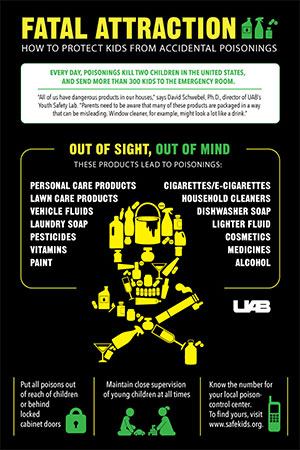 Click to enlargeThe summer months often mean more time spent at home for kids. While the break from the books can be enjoyable, one University of Alabama at Birmingham child safety expert says there is one important lesson both children and parents still need to learn: how to prevent poisoning.
Click to enlargeThe summer months often mean more time spent at home for kids. While the break from the books can be enjoyable, one University of Alabama at Birmingham child safety expert says there is one important lesson both children and parents still need to learn: how to prevent poisoning.
Every day in the United States, poisonings send more than 300 children to the emergency room and two children die as a result, according to the Centers for Disease Control and Prevention. During the warmer months of the year, when school is out, higher volumes of poisonings have been reported by the American Association of Poison Control Centers.
David Schwebel, Ph.D., associate dean for Research in the Sciences in the UAB College of Arts and Sciences and professor in the Department of Psychology, recently published a study in the Journal of Pediatric Psychology that not only suggests ways manufacturers can reduce the risk of accidental poisonings, but how parents can do so as well.
“All of us have dangerous products in our houses,” said Schwebel, who directs UAB’s Youth Safety Lab. “Parents need to be aware that many of these products are packaged in a way that can be misleading. Window cleaner, for example, might look a lot like a drink.”
Besides household cleaners of all kinds, Schwebel says poisons include soaps — both laundry and dishwasher, pesticides, paint, vehicle fluids, lawn care products, lighter fluid, certain types of plants, alcohol, medicines, vitamins, nicotine/cigarettes/e-cigarettes, cosmetics, and personal care products.
To protect kids, Schwebel suggests:
- Put all poisons out of reach of children or behind locked cabinet doors.
- Maintain close supervision of young children at all times.
- Know the number for your local poison-control center.
“Store these poisonous products safely — put them in high places where young children, who are at higher risk, can’t reach,” Schwebel said. “And use cabinet locks if you need to store them in a lower place.”
Schwebel says, in general, teaching kids can also be an effective way to prevent accidents with children, but it cannot be relied on.
“With young children, supervision has to be constant,” he said. “That’s hard to do, I know; but a poisoning can happen very quickly. You need to figure out a way to keep your child safe even when your attention is distracted by something in the oven or if the doorbell rings, for example.”